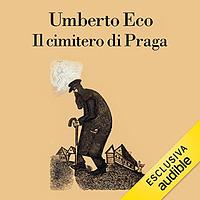Take a photo of a barcode or cover
I really like Eco and went into this prepared to like it but ... I could barely finish it. The first 100 pages were just setting up one character and how awful it was. After 20 I think I got the point...
It did get better, but I just never think I recovered from that initial dislike of the opening. I understand we're not supposed to like him, but there was so much there it spilled into me not just disliking the character, but disliking the story itself.
The final note at the end, for anyone without the historical context of the story, may be interesting to read first (it's not really spoiler-laden).
I'd like to have a beer with Umberto Eco. I think he'd be a fascinating guy to talk about history with.
I'm having trouble finding the words to describe this book. 'Excellent' and 'engrossing' come to mind but so do 'vile' and 'revolting'. I suppose the latter describe the plot and contents while the former describes how it's all woven together.
Our protagonist is an amnesiac lawyer, Simone Simonini, who works as a forger of documents (wills, deeds, letters, etc.) and as an informer for the French, Prussian and Russian intelligence services. Mainly he forges documents for them to indict the bad guy du jour be it Jesuits, Freemasons or the Jews of whatever plagues society at the moment. The plot follows Simone recounting, in his journal, the events of his life from a young age to the recent events that caused his amnesia.
As it turns out, Simonini is the perpetrator of a large number of (real life) forgeries accusing the Jesuits, Freemasons or Jews of worshiping the devil or conspiring to take over the world.
Which leads to the vile and revolting part of the book. Mr Eco does not shy away from spelling out the anti Jewish prejudices of the late 19th century of the lurid descriptions of the supposed Masonic rites and it's all told in the first person so in story these 'facts' are presented as accurate. It gets a little disgusting to read at times. Much as I enjoyed the book, I had to frequently put the book down and take a walk when the racism started to run off the page.
So, an excellent and fascinating book, but a strong stomach is necessary to get through the main character's racism.
I'm having trouble finding the words to describe this book. 'Excellent' and 'engrossing' come to mind but so do 'vile' and 'revolting'. I suppose the latter describe the plot and contents while the former describes how it's all woven together.
Our protagonist is an amnesiac lawyer, Simone Simonini, who works as a forger of documents (wills, deeds, letters, etc.) and as an informer for the French, Prussian and Russian intelligence services. Mainly he forges documents for them to indict the bad guy du jour be it Jesuits, Freemasons or the Jews of whatever plagues society at the moment. The plot follows Simone recounting, in his journal, the events of his life from a young age to the recent events that caused his amnesia.
As it turns out, Simonini is the perpetrator of a large number of (real life) forgeries accusing the Jesuits, Freemasons or Jews of worshiping the devil or conspiring to take over the world.
Which leads to the vile and revolting part of the book. Mr Eco does not shy away from spelling out the anti Jewish prejudices of the late 19th century of the lurid descriptions of the supposed Masonic rites and it's all told in the first person so in story these 'facts' are presented as accurate. It gets a little disgusting to read at times. Much as I enjoyed the book, I had to frequently put the book down and take a walk when the racism started to run off the page.
So, an excellent and fascinating book, but a strong stomach is necessary to get through the main character's racism.
Eco made a bold move writing this book. Over the course of the novel's events he attempted to blend deeply researched history with fiction in a way that highlights how conspiracies originate. As always, his narrative devices were genius and he was able to demonstrate historical phenomenon through revelation that comes about through literary phenomenon. This is a book that's worth reading in the world of anti-Semitism and conspiracies in which we live today.
Another fun book from Eco that reads well, engages, and titillate, but misses a handful of key opportunities to resonate. Also, the second time one of his books has left me wondering..."do you have to dedicate the last dozen pages of your book to explaining the book we just read, or is there another way to do this?"
challenging
dark
informative
medium-paced
Eco is always a complex read, and this book is more confusing than most for its wide expanse of European history, politics and subterfuge in the 19th century, as well as the unreliable narrations that attempt to lead you astray and fill the book with paranoia and uncertainty. Nevertheless I greatly enjoyed it as a thought-provoking novel - as I did The Name of the Rose. Just be prepared to look up a lot of esoteric info if you wish to understand the intricacies of the plot.
challenging
dark
mysterious
slow-paced
Plot or Character Driven:
A mix
Strong character development:
No
Loveable characters:
No
Diverse cast of characters:
No
Flaws of characters a main focus:
Yes
dark
funny
informative
mysterious
reflective
slow-paced
Plot or Character Driven:
A mix
Strong character development:
No
Loveable characters:
No
Diverse cast of characters:
No
Flaws of characters a main focus:
Yes
dark
mysterious
reflective
slow-paced




